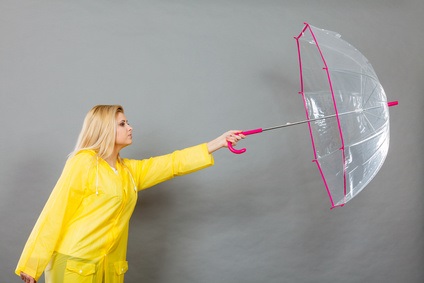As we’re now into 2018 we are already experiencing extreme weather conditions right across the UK. There is a common misconception that all events related to extreme weather conditions are  seen as “acts of God” when this is not necessarily the case. All personal injury claims will be treated on a case-by-case basis but just because the weather may be related to accidents and injuries, this is not always a defence against negligence.
seen as “acts of God” when this is not necessarily the case. All personal injury claims will be treated on a case-by-case basis but just because the weather may be related to accidents and injuries, this is not always a defence against negligence.
We will now take a look at some of the more common issues connected with extreme weather conditions, flying debris and personal injury claims.
Driving Conditions
It can be extremely treacherous at this time of year with dark nights, extremely cold temperatures and road surfaces which are not always easy to drive on. While there is a legal obligation for local authorities to ensure, as much as possible, that ice and other dangers are cleared as soon as possible, this can take some time. We sometimes forget that drivers also have an obligation to adapt to the immediate weather and road conditions.
There is every chance that injuries caused by a mixture of dangerous driving and dangerous road conditions can result in a successful personal injury claim. Every time a driver goes behind the wheel they have an obligation to drive safely but this is not always appreciated with common events such as:
- Speeding.
- Tailgating.
- Inefficient use of car lights.
- Failure to replace dead light bulbs.
- Inappropriate driving styles for prevailing weather.
While speeding and tailgating are obvious dangers on safe road surface conditions, they are even more dangerous on icy roads and in extreme weather conditions. We also sometimes fail to appreciate the role which car lights play in dangerous conditions. If you potentially cause an accident on the roads and you fail to use your lights appropriately or perhaps one of your headlights or sidelights were not working properly, this could get you into serious trouble in a car accident claim. Not only are car headlights and sidelights useful for the driver of the vehicle but they also play an important role in how other road users react to your presence.
Work Injuries Caused By Extreme Weather
There are many employment positions where individuals are called out in difficult weather conditions and sometimes subjected to harsh winds and extremely low temperatures. Examples include the likes of a breakdown mechanic, salt-spreading operator and power repair technicians to give you just a few examples. However, it is worth remembering that even if you regularly work in extreme weather conditions your employer still has an obligation for your health and safety.
Your employer should take into account factors such as:
- Timing – was it really necessary to send someone to work in extremely cold weather conditions? Could the work have been postponed until the weather was more favourable?
- Risk assessment – aside from extreme weather conditions, many people fail to note the “wind chill factor” which can have a major impact upon rain, snow and ice working conditions.
- Training – it goes without saying that those who have to work in extreme weather conditions should have initial and continuous training. This will ensure that each employee is aware of the dangers, how to avoid them and in extreme circumstances when to call it a day because of health and safety issues.
- Safety equipment – those asked to work in the most extreme of weather conditions should be supplied with the relevant safety equipment. While this may offer limited protection in some circumstances, it could be the difference between a significant weather related injury and safety.
- Regular breaks – if you work in extreme weather conditions your employer also has an obligation to ensure you have regular breaks with hot drinks and food provided where relevant. Tiredness does kill and if your employer has failed to provide regular rest breaks they may well be liable for compensation in the event of injury.
In essence, just because you expect to work in extreme weather conditions this does not remove the duty of care that an employer has to their employees. If you feel you have incurred injury because of extreme weather conditions and negligence by your employer then you may well have a claim for compensation.
Flying Debris
Unfortunately, the extreme weather conditions we have been experiencing recently can lead to flying debris which can be potentially dangerous and in some cases life-threatening. We have seen trampolines flying through gardens, garden fences uprooted, road signposts flying through the air as well as relatively small but potentially dangerous debris all around us. It goes without saying that in extreme weather conditions we are all legally obliged to ensure objects in and around our house and garden are secure as far as possible.
Flying debris can lead to a number of dangerous situations such as:
- People hit by flying debris in windy weather conditions.
- Car crashes caused by flying debris.
- Unsecure wood and metal objects ripped off buildings.
- Damage to property caused by flying debris from a neighbour’s garden.
If you can prove that as far as possible you attempted to secure items in your garden and around your home then this should be enough to avoid a negligence ruling and a potential compensation claim.
There will be occasions where it is possible for a claimant to prove that items were not securely fastened in times of extreme weather which can in some circumstances lead to potentially sizeable compensation claims. Do not automatically assume that the “act of God” excuse will impact any potential compensation claim you have for injury.
Proving Negligence
While there are obvious cases where third parties could have perhaps done more to secure loose fitting items during extreme weather conditions, or offered greater protection to their employees, it can be difficult to prove negligence. One example which is often cited is that of debris falling from the back of a lorry and causing an accident for vehicles driving behind. Legally it is not easy to prove beyond reasonable doubt that the debris first of all fell from the lorry and secondly caused the accident. The use of so-called dash cams can provide extremely useful evidence in such cases and support any personal injury claim. There are also good old-fashioned witness statements which add credence to any compensation claim.
Duty Of Care
In reality it is not only employers who have a duty of care to their employees but we all have a duty of care to a certain extent. There will be occasions where individuals will need to venture out in extreme weather conditions but you could argue, unless it was a case of life or death, by venturing out in extreme weather conditions you are placing yourself in danger. If you were to have an accident as a result of flying debris it might be difficult to prove any level of negligence towards a third party and at best the courts may deem there to be a shared liability.
Insurance Cover
It may be a small consolation to those who suffer injury as a consequence of extreme weather conditions but the likelihood is that any third parties found negligent will have some form of insurance cover. This may be car insurance, work insurance or general household insurance and it is likely that any compensation would be paid out by the defendant’s insurance company.
In the event of extreme weather conditions it is advisable to proceed with caution if you do need to brave the elements and remember there is no rush. You should also ensure you have adequate clothing, food and water, methods of communication and safety equipment in your vehicle just in case you break down or are left stranded.



